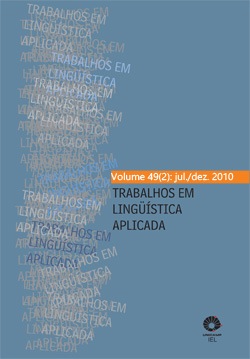Abstract
O presente artigo reflete sobre os limites sócio-estruturais que impedem a participação social mais ampla dos grupos economicamente desfavorecidos. O texto argumenta que, embora a Internet não garanta tal participação, ela propicia novos espaços para circulação social em práticas letradas diversas, inclusive aquelas de natureza hegemônica. Para ilustrar essa questão o artigo discute dados de uma entrevista realizada com um jovem líder que atua em uma comunidade localizada na periferia da cidade de Campinas, São Paulo. Os argumentos e colocações apresentados pelo entrevistado nos levam a refletir sobre a democratização dos modos de produção e consumo do conhecimento, em geral, e sobre a possibilidade de apropriação das TICs por comunidades periféricas, em particular.
ABSTRACT:
The present paper focuses on the limits socio-structurally imposed to exclude the social participation of economically disadvantaged groups in different spheres of cultural production and consumption. The paper argues that, although not guaranteeing new modes of participation, the Internet offers new virtual spaces that broaden the access to diversified ways of social circulation and participation in digital literacy practices, including those hegemonic in nature. To illustrate some of these major issues the study focuses on the data of an interview given by a young leader from a peripheral community located on the outskirts of the city of Campinas, São Paulo. The statements and arguments presented by the interviewee lead us to reflect on the process of democratization of knowledge production and consumption, in general, and about ICT appropriation by peripheral communities, in particular. Palavras chaves: Inte
Keywords: Internet; social participation; local appropriation of ICT resources; digital literacies
References
BAUMAN, Z. (2001). Moderidade Línquida. Rio de Janeiro: Jorge Zahar.
_______. (2003). Comunidade: A busca por segurança no mundo atual. Rio de Janeiro: Jorge Zahar.
BRAGA, D. B. (2007a). Developing Critical Social Awareness Through Digital Literacy Practices Within the Context of Higher Education in Brazil. Language and Education a, v. 21, p. 180-196.
_______. (2007b). Práticas letradas digitais: considerações sobre possibilidades de ensino e reflexão social Crítica. In: Júlio César Araújo. (Org.). Internet & Ensino - Novos gêneros, outros desafios.
Rio de Janeiro: Lucerna, v. 1, p. 181-195.
_______. (2007c). Social interpretations and the uses of technology: A Gramscian explanation of the ideological differences that inform programmers positions. Critical Literacy in Global Citizenship Education, v. 1, p. 80-89.
BUZATO M. E. K. (2007). Entre a fronteira e a periferia: linguagem e letramento na inclusão digital.
Tese de doutoramento, IEL, UNICAMP.
_______. (2008). Inclusão digital como invenção do cotidiano: um estudo de caso. Revista Brasileira de Educação, v.13, n.38, p.325-413.
CERTEAU, M. (1994). Invenção do cotidiano: artes do fazer. Tradução Ephrain Ferreira Alves Petrópolis: Vozes.
GEE, J. (1991). Social Linguistics: Ideology in Discourses, London: Falmer Press.
GIDDENS, A. (1987). Social Theory and Modern Sociology. Cambridge: Polity Press.
GNERRE, M. (1991). Linguagem escrita e poder . São Paulo: Martins Fonte.
GRAMSCI, A. (1971). In: Q. Hoare & Nowell-Smith (Eds.) Selection from the Prison Notebooks London: Lawrence & Wishart.
JESSOP, B. (1989). Capitalism, nation-states and surveillance. Em: Held, D e Thompson J.B. Social Theory and Modern Societies : Anthony Giddens and his critics. Grã-Bretanha: Cambridge University Press.
HEATH, S. B. (1983). Ways with Words: Language, life and work in communities and classrooms. Nova Iorque: Cambridge University Press.
MICHAELS, S. E COLLINS M. (1984). Oral Discourse Styles: Classroom interaction and the acquisition of literacy. Em: Tannen, D (eds) Coherence in Spoken and Written Discourse. Norwood, New Jersey: Ablex Publishng Corporation, p. 219-244.
GUMPERZ, J. J. (1977). Sociocultural knowledge in conversational inference. Em: Saville-Troike, M.
(eds) Georgetown Round Table on Language and Linguistics. Washington: Linguistics and Anthropology.
POYNDER, E.S. (2006). http://poynder.blogspot.com/2006/03/interview-with-richard-stallman.html.
Consultado em 2/2/2007.
RAYMOND E.S. (2000). The Cathedral and the Bazaar http://www.catb.org~esr/writings/cathedral-bazaar/ cathedar-bazaar. Consultado em 30/01/ 2007.
Trabalhos em Linguística Aplicada uses a Creative Commons (CC-BY) license, thus preserving the integrity of the articles in an open access environment. Journal authors retain the copyright of their work by licensing it under the Creative Commons Attribution license, which allows articles to be reused and distributed without restriction, as long as the original work is correctly cited.
Intellectual Property and Terms of Use
All content published in Trabalhos em Linguística Aplicada, unless otherwise specified, is under the Creative Commons Attribution License (CC-BY). This allows the material to be shared and adapted without restriction, as long as due credit is given and any changes made are indicated.
The authors retain the copyright to their work and take full responsibility for its content in the event of any challenge by third parties. The opinions expressed by the authors of the articles are their sole responsibility.
TLA reserves the right to make normative changes to the originals, such as changes to spelling and grammar to comply with the cultured norm of the language, as well as adjustments to form related to the editorial standard of the journal.

